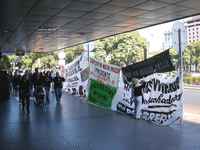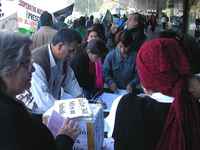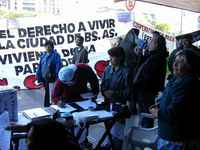Buenos Aires: Housing is a right, not a business
The autonomous gathering of civil society organisations in Carlos Pelegrini 211 has now collected more than 3,000 signatures. During a ‘week-long camp’, from 12th to 16th of May 2008, they will be present 24 hours a day (120 hours non-stop) campaigning for a positive response for decent housing projects in the Autonomous City of Buenos Aires.
We hereby give notice of the serious situation in which we find ourselves, owing to the failure of the Buenos Aires Institute of Housing (IOH)1 to comply with Law 341 and its amendment number 964.
This law was passed in 2000, with the aim of allowing city residents in emergency housing need to access credits for the production of their sole and permanent place of dwelling, on an individual or collective basis.
From the time of the law’s ratification, the city has never released the funds necessary in order to actually undertake its operation. In fact, while the number of people registered on the Low-Income Self-Build Housing Programme2 (which prior to the new implementation of the law, approved in the Council Minutes of 23rd October 2006, was known as the Self-Build Housing Programme3 ) and for individual credits has increased, the budgets presented to the City Council for forthcoming financial years have decreased. This has led to the current situation, where more than 400 organisations including over 8,000 families are registered to apply for credits, but only five projects have been completed since the passing of the law 8 years ago, insufficient to meet even the housing needs of 350 families. It should be recalled that on 31st October 2005, the operation was shut down – irregularly, given its legal status which has not been revoked - preventing the registration of new organisations, as well as the initiation of projects by organisations already registered. Furthermore, following the new implementation, the programme’s ‘self-build’ element has been solely nominal; since then, the only possible undertaking has been the purchase of 13 sites, which have not progressed past the administration and planning stages in the last 18 months, owing to the failure of the Institute, as the owner of this land, to carry out the necessary procedures.
During these 8 years, 32 projects were initiated which could not be completed to the timing and planning specifications of the IOH due to lack of funding, which is supposed to be made available in its entirety to organisations as soon as it is granted. However, this has never been the case due to lack of provision by the Executive, which indicates a failure in the fulfilment of its duties as a public body.
A further 62 sites have been bought, again with credits already granted to the organisations, and once again without the prospect of initiating projects, due to the City Government’s failure to release funding for construction. Because of this, before abandoning ship the previous administration took steps towards obtaining funding for projects where land had already been purchased from the Undersecretary of State for Urban Development and Housing – not, it seems, from altruistic motives but political ones, as the ex-President of the IOH now manages these funds from within the National Department for Housing Inclusion and Urbanism. This request was implemented on 24th April 2007, but to date no money has been assigned to the projects. Faced with requests for an explanation about the lack of response regarding these funds, the National Department responded in writing that ‘In the light of the change of authority in the Autonomous City of Buenos Aires, the new administration of the Institute of Housing of the City has not to date made any representation in pursuit of formal procedures, which is an indispensable requirement for the processing of finance for the aforementioned projects (No Financial Objection)’. These funds are subsidies of the City of Buenos Aires, which must supplement the amount with its own resources; however, it has never budgeted for this, thus denying more than 1,500 families the prospect of housing solutions.
Unfortunately, the problems extend even further than this. Most seriously, since the new administration took office, it has not only followed in the footsteps of previous administrations, but has also confirmed that this year’s budget of 35 million pesos (19 for individual credits and 16 million for collective operations, apportioned by the IOH unilaterally and arbitrarily) is assigned to the completion of ‘some’ of the projects underway. This amount would cover the completion of no more than 8 projects, meaning the suspension of the other 32 projects already underway. New projects will not be initiated, nor new sites acquired, for the 290-plus organisations which have seen a consistent increase of land prices in the City over time. This makes the possibility of acquiring land still less likely, given that these organisations have available to them only 20% of the total credits granted for projects, amounting to 97,500 pesos per family group to cover the cost of land purchase, construction and professional services.
It is possible to carry out projects in this way - in fact there are 5 examples - but this is not a business, and so there is little interest in making it work. Moreover, even when it is possible to manage our projects with these sums, those involved in bidding for building and subcontracting submit estimates of 150,000 pesos for construction alone (since these credits are not for land purchase), according to a statement given by the President of the IOH, Roberto Apelbaum, on Monday 5th May 2008 to the City Council, regarding credits for beneficiaries of the Casa Amarilla Programme. These words were reproduced in a Council summons to the official following a request from the IOH to modify Law 1251, which created the Institute and granted its powers. In the same speech, he proposed to transfer operations for the various low-income developments, settlements and temporary housing areas located in the south of the city ( Villas 20, 19, 17, 15, 13b, 3, 6, 1-11-14 and NHT Zavaleta ), which would divest the Institute of its funds for this financial year, implying the transfer of 200 million pesos alongside its powers. The total amount granted for this year is 417 million pesos, from which must be discounted salary costs. These were the subject of recent media attention following the proliferation of managerial positions at the Institute which led to the doubling or tripling of salary costs, not included in this year’s budget passed by the City Council, which will have to be deducted from programmes. Moreover, it was proposed that the organisation’s future powers and functions be modified, leaving it to act like a private bank, and excluding the great majority of middle and lower class citizens with housing problems.
Because of aforementioned, we demand:
- The opening up of the Programme.
- Land purchase.
- Transfer of property titles for the 13 sites currently in the name of the Institute of Housing to the organisations.
- Payment for the certification of projects underway which are not among the 19 chosen arbitrarily by officials.
- Project initiation.
- Effective allocation of individual credits.
- Activation f the Temporary Housing Programme
- Effective implementation of land banking
1 Instituto de Vivienda de la Ciudad de Buenos Aires or IVC in Spanish.
2 Programa de Autogestión para el Desarollo del Hábitat Popular or PADHP in Spanish.
3 Programa de Autogestión de Viviendas or PAV in Spanish.



